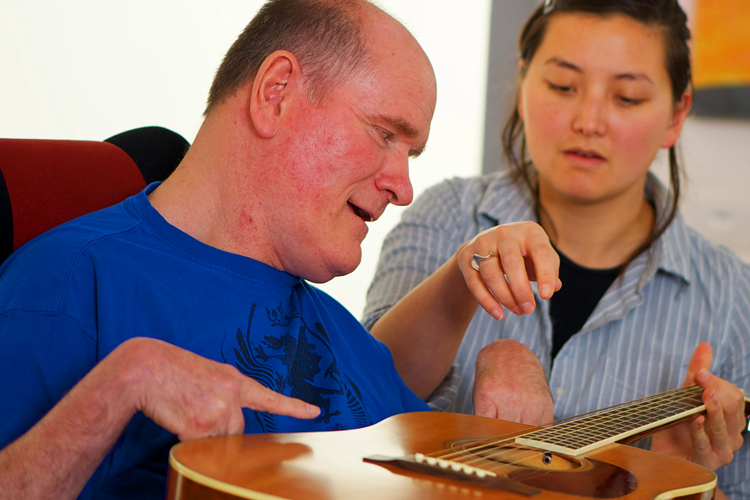
Dementia Disorders
For those suffering from dementia disorders, such as Alzheimer’s disease, the benefits of music therapy can be vast.
Music therapy can help to:
- Assess cognitive ability
- Assist in recall and language skills
- Decrease the frequency of agitated or problem behaviors
- Decrease depression
- Increase participation and enhance social/emotional skills
- Respond and interact -even in the late stages of dementia
In addition to the benefits for the client, music therapy can also provide a bridge for interaction between an affected person and his family. When working with a person and his family, music therapy can provide:
- A forum to share common experiences and enjoyment
- Meaningful time spent together in a positive and creative way
- Relaxation for the entire family
- Stimulation for reminiscence of family bonds, unity, and intimacy for families
- Respite for the caregiver and family
The Older Adult
Music therapy is effective with older persons who have functional deficits in physical, psychological, cognitive, or social functioning.
Music Therapists offers older adult services in:
- Adult care homes and day care centers
- Rehabilitation hospitals
- Hospitals
- Retirement and residential care facilities
- Senior centers and senior evaluation programs
- Hospice facilities
- Psychiatric treatment centers
- In-home care
Music Therapy with the older adult can provide help with:
- Memory recall
- Anxiety and stress reduction
- Effectiveness of physical rehabilitation
- Positive changes in mood and emotions
- Increased awareness of self and environment; sense of control over one’s life
- Nonpharmacological management of pain and discomfort
- Finding interest in things even when no other approach is effective
- Emotional intimacy and social interaction with spouses, family, and caregivers
Special Needs
Music therapy is an effective therapeutic and educational tool for children and adults with developmental disabilities that can significantly improve the skill levels of those with mental retardation, autism-spectrum disorders, Rett Syndrome, learning disabilities, attachment disorder, Cerebral Palsy, and others.
When working with developmental disabilities, music therapy can impact an individual’s:
Cognitive Skills – stimulates and focuses attention, which is especially significant for those who do not respond to other interventions.
Physical Skills – stimulates and organizes muscle response for people with neuromuscular disorders, and alters perception of pain.
Communication Skills – stimulates and motivates speech, provides an avenue for nonverbal communication, such as use of an augmentative device or an alternative form of communication.
Social Skills. – provides support for practicing these skills, and encourages cooperation in a production of music.
Emotional Skills – Encourages participation in making music, motivates the control of emotional outbursts, alters the mood of those listening and participating, and increases self-esteem.
Medicine
Medical Music Therapy is defined as “the prescribed use of music and musical interventions to help with health. This treatment is used to help restore, maintain, or improve health. It is used to address emotional, physical, and spiritual well-being.” (AMTA 2006)
Today, qualified music therapists are employed in many settings including:
- Acute care
- Surgery and recovery
- Rehabilitation centers
- Oncology treatment centers
- Neonatology
- Pain management
- Obstetrics
Music therapy in the medical setting can be used to:
- Counteract depression and feelings of isolation
- Decrease headaches and pain
- Calm and sedate, and induce sleep
- Promote rehabilitative movement and maintain physical activity
- Reduce apprehension, anxiety, and fear
- Reduce muscle tension
- Provide support to cope with chronic or terminal illness, grief, or loss,
- Adjust respiration
- Lower blood pressure, reduce heart rate, and improve cardiac output
- Maintain social activity and provide a sense of community
- Provide intellectual and sensory stimulation
Rehabilitation
Music Therapy in the rehabilitation setting seeks to “facilitate recovery from loss of function.”
In this setting, music therapists may serve a large variety of individuals with varying diagnoses including: (AMTA 2006)
- Stroke
- Traumatic brain injury
- Neurological issues
- Spinal cord injury
- Cardiac impairment
- Arthritis
- Prolonged reconditioning
- Amputation
- Fractures
Music therapy goals in the rehabilitation setting may include:
- Increasing cognitive functioning
- Increasing motor control
- Increasing communication
- Increasing decision-making abilities
- Increasing coping skills
- Increasing relaxation
- Increasing social interaction
- Decreasing anxiety and stress
Hospice and Palliative Care
Studies support the use of a variety of techniques such as song writing, music-prompted reminiscence, imagery, singing, and instrument playing with hospice patients and their families. Music therapy in end-of-life care can impact many areas of a patient’s life, including their physical, psychological, social, and spiritual wellness.
Music Therapy in Hospice and Palliative Care can be used to help:
- Alleviate fears and anxieties
- Decrease feelings of isolation
- Encourage participation in physical activity and exercise
- Promote relaxation and alleviate insomnia
- Initiate communication with family members
- Reinforce identity and self-concept
- Provide a source of comfort throughout the grieving process
- Decrease the perception of pain and severity of the side effects of chemotherapy
- Aid in the process of life review
- Provide opportunities to express emotions in a non-threatening and accepting environment.
Preventive Health and Wellness
Music therapy has become an active part of the preventive healthcare field. Music therapists work with patients with
- Anxiety, stress management, and phobias
- Short-term or chronic pain issues.
- Difficulty with relaxation
- Feelings of helplessness
- Pain
- Fear of medical procedures
In recent years, Music Therapy has encompassed a variety of additional wellness goals including:
- Enhanced quality-of-life
- Maximized well-being and potential
- Increased self-awareness and self-esteem
- Personal growth
- Interpersonal connections
- Self-discovery



